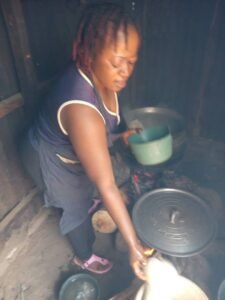In the bustling town of Adikpo in Benue State, Nigeria, lovingly referred to as “London” by locals, a 35-year-old woman named Wunahemba wakes up every morning with watery eyes and a persistent cough. These symptoms serve as a constant reminder of the fateful day 15 years ago when she inhaled smoke from firewood while cooking in her family’s restaurant. Today, Wunahemba faces the same health challenges that her late mother succumbed to – respiratory complications. Sadly, her story is not unique. Countless women in Nigeria face similar struggles, as indoor air pollution from traditional cooking methods has become a silent but deadly threat to their health. Gom Mirian writes.
According to the World Health Organization (WHO), “indoor air pollution is responsible for approximately 95,000 deaths in Nigeria annually, with women and children being the most affected. If a woman cooks breakfast, lunch, and dinner, it is equivalent to smoking between three and 20 packets of cigarettes a day.”
The use of solid fuels like firewood and charcoal for cooking and heating exposes individuals to high levels of harmful pollutants, including particulate matter and carbon monoxide. These pollutants have severe health consequences, leading to respiratory diseases and contributing to the burden of non-communicable diseases in the country.
The underlying causes of this phenomenon are deeply rooted in poverty, lack of access to clean cooking facilities, and cultural norms.
In many Nigerian households, traditional cooking methods are deeply ingrained in cultural practices, and the use of modern, cleaner cooking technologies is often limited by financial constraints. As a result, women like Wunahemba continue to bear the brunt of indoor air pollution, facing the dual burden of household responsibilities and compromised health.
“The smoke disturbs me and is killing my eyes, tears flow constantly. I use firewood because gas here is too expensive and difficult to even get,” Wunahemba lamented in her windowless kitchen as she sniffled and attempted to wipe away dripping tears with the back of her wet hands.

She has been running her family’s restaurant for the past 15 years, ever since her mother passed away. “I use about 1,200 naira ($1.33 US) worth of firewood daily. Although it was previously cheaper,” she said. “Every day, I battle with the effects of inhaling smoke from cooking. It’s not just a physical burden but also an emotional one, knowing that my mother suffered the same fate,” she said
When asked how she managed her predicament from the smoke, she explained further, ” I have to visit the pharmacist every day to obtain medication for my recurring catarrh symptoms.” Hours after I left her Restaurant, I could still feel the irritation from the smoke in my eyes and throat.
In an attempt to nourish their families and earn a living, countless women are undoubtedly exposed to smoke and toxins that are associated with an endless list of health problems, including pneumonia, lung cancer, low birth weight, impaired vision, and cardiovascular diseases.
Some women, like Mummy Msendoo, try to minimize their exposure by not staying by the fire while cooking. However, the risk remains, and many women develop respiratory ailments as a result of using firewood for cooking.

In the festive atmosphere of Christmas celebrations, a well-dressed woman stood in front of her shop and expressed her perspective. She stated, “Although I also rely on firewood for cooking, I do not always need to remain by the fire. However, when preparing a dish such as ‘swallow’, it is necessary for me to stay close.”
When questioned about whether she knew any women who had experienced respiratory illnesses due to the use of firewood, she eagerly replied to African Health, saying, “Oh, many people!” Mummy Msendoo proceeded to provide an example of a well-known rice seller in town, Mama Mbapeen. Suspecting that Mama Mbapeen had developed asthma and high blood pressure as a consequence of her many years in the rice business.
Fortunately, ongoing initiatives and organisations are working to address the problem of indoor air pollution in Nigeria. The Clean Cooking Alliance, a global organisation dedicated to promoting clean cooking solutions, has been actively involved in raising awareness and advocating for the adoption of cleaner cooking technologies. The government, local initiatives and social enterprises are also working to provide affordable and sustainable alternatives to traditional cooking methods, aiming to improve the health and well-being of women and their families.
Experts and healthcare professionals emphasise the urgent need for action to address indoor air pollution in Nigeria. Dr. Agustin, a renowned medical practitioner and founder of Holy Child Hospital in Adikpo, highlighted the long-term consequences of exposure to indoor air pollution, stating, “We are witnessing a rising number of respiratory illnesses among women and children, directly linked to the use of solid fuels for cooking.
“It not only affects the lives of individuals but also places an immense burden on our healthcare system,” he said. “We need to invest in providing affordable, accessible, and sustainable clean cooking solutions across Nigeria. “This is a public health crisis that demands immediate attention.”
To combat this issue, individuals, organizations, and governments can contribute in several ways. Supporting the adoption of clean cooking technologies, such as improved cookstoves and clean fuels, can significantly reduce indoor air pollution and its associated health risks. Government policies and incentives can play a crucial role in promoting the widespread adoption of cleaner cooking solutions, ensuring that women like Wunahemba have access to safe and sustainable cooking options.
The impact of indoor air pollution on Nigerian women is a pressing issue that demands collective action. Wunahemba’s story serves as a powerful reminder of the daily struggles faced by women who continue to cook with traditional methods, risking their health and well-being. By raising awareness, advocating for change, and supporting innovative solutions, we can work towards a future where women no longer have to endure the silent burden of indoor air pollution. It is time to give voice to their silent struggle and pave the way for a healthier and brighter future for all.



